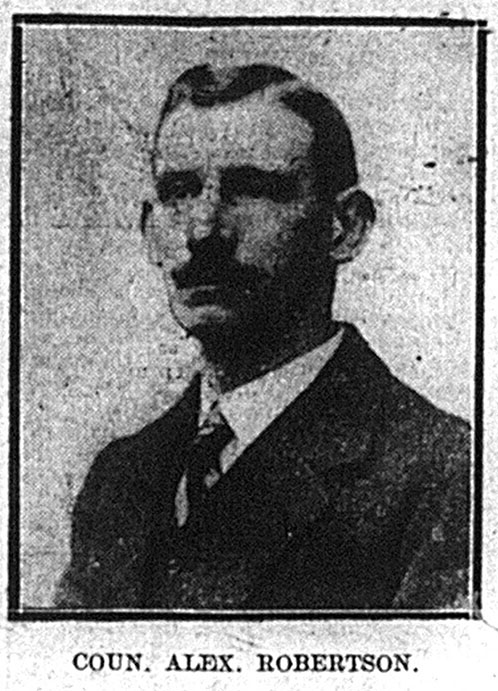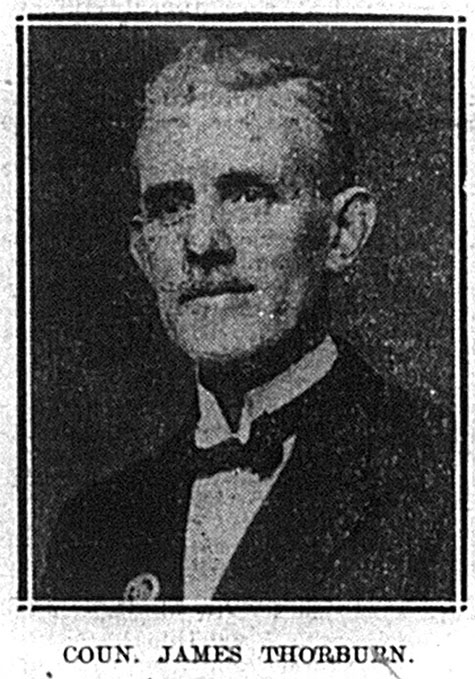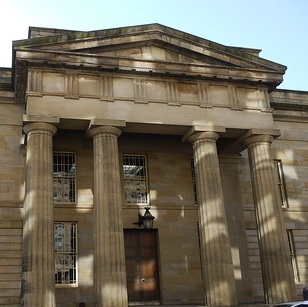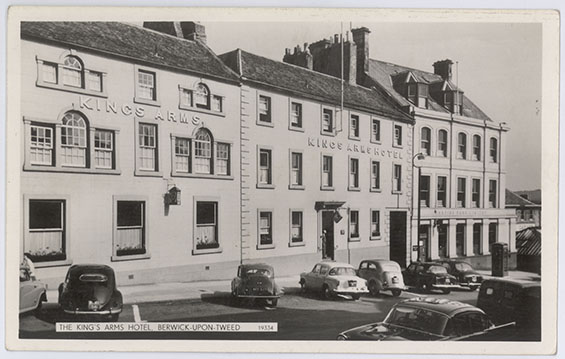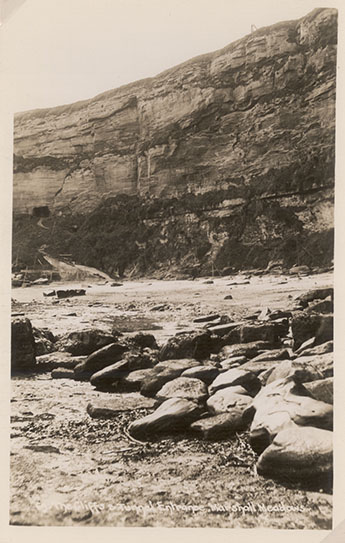BERWICK’S NEW COUNCILLORS
Coun. Alex. Robertson is a native of Edinburgh and was educated at George Watson’s College and Milton Public School, where his father, who dies a few years ago, was Headmaster. When he left school, he went to well – known seed merchants in Leith to serve his apprenticeship. Having completed his apprenticeship and acquired a good knowledge of the seed trade, at the age of 19 he received an appointment with Messrs Thos. Carter and Sons, Seed merchants, Berwick. For many years he was a faithful servant of this local firm. Some years ago, he served his connection with this firm and launched out on his own as a seed merchant, being appointed agent for Garton, the famous world seed growers. His business had brought him into contact with a large number of farmers on the Borders, and he is a familiar figure at Berwick Corn Market.
Coun. Robertson is a member of Wallace Green Church, and is a Unionist, being a member of the local Unionist Club. He has been a prominent member of Berwick Town Golf Club. He is a member and has been President of Berwick St. Andrew’s Club, and also the Burn’s Club. He is a member of Wallace Green Literary Society, and has delivered a paper to this Society, and also St. Aidan’s Society.
On several occasions Coun. Robertson has been approached to stand for the Council, but until this occasion he has been unable to see his way to accept. Although he has taken up till now on active part in public affairs, he has always been interested in the welfare and development of Berwick, and he foresees the possibilities of making Berwick a prosperous town again.
A most popular candidate in Mr James Thorburn, Barrack Warden, was returned at the top of the poll for the North Ward. A man of most engaging manner, Mr Thorburn has taken a keen interest in the life of Berwick since he has come amongst us, and that he is an acquisition to the municipality is undoubted.
Mr Thorburn is a native of Melrose, and there he had his early training. He began life’s battle by serving his apprenticeship to the grocery trade in his native town. Imbued with martial spirit, he enlisted into the 18th Hussars, at Berwick-upon-Tweed. He was afterwards transferred to the 20th Hussars and proceeded to India with that regiment. For 6½ years he served in Central India, and was afterwards transferred to Egypt, where he served for 18 months. He returned to the regiment at Cantebury and served on various home stations. In 1906, at Shorncliffe, he was promoted Sergeant; and on 1st January 1914, he received an appointment as Quarter-Master-Sergeant and was transferred to the Northern Cavalry Depot at Scarborough.
There his ability as an accountant and clerk was put to the fullest test. The Great War was declared in August of that year. When we look back with a true perspective to those days, we can now appreciate more fairly the noble work that was done behind the lines. Mr Thorburn would have dearly loved to have gone on active service for his King and Country, but his services were required at home. There was a mobilization of great forces then, unprecedented in the annals of this country. Between 3rd August 1914 to January, 1915, Mr Thorburn put through to the front no less than 12,000 men, in addition to 1600 reservists called up on the outbreak of war. During the war, at Scarborough he had to feed from the Depot no less than four regiments of Hussars overseas with horses, stores and men; but afterwards he was transferred as Quarter-Master-Sgt. to 5th Reserve Cavalry Regiment at Tidworth, where 4 Hussars and 5 Yeomanry Regiments, about 4,000 strong, were catered for. Mr Thorburn had a staff of 20 clerks under his direction, but he spared not himself night nor day. His services were appreciated at their true value in Higher circles, and he was strongly recommended for commissioned rank. Nature, however, imposes her limitations upon poor mortals. The strain of this great work of organization told its tale. Mr Thorburn was literally carried from his work into hospital, where he had to undergo a severe operation. He is now, one might say, a memorial to a surgeon’s skill. It is a marvel that he is here today, and able to take such a prominent part everyday life. He has the indomitable spirit. Mr Thorburn was declared medically unfit for service overseas, and his ambition to bear His Majesty’s warrant was shattered.
After 24 years’ active service, he resigned from the Army. He received an appointment as Barrack warden at Strensall Camp. After serving about 3 years there, he received a transfer to permanent appointment as Barrack Warden at Berwick-upon-Tweed in July 1921. It seems a coincidence that Mr Thorburn’s military life should begin and end at Berwick-on-Tweed.
Mr Thorburn has been an active member of the Berwick Branch of the British Legion, and he is also a member of the Northern Area of the British Legion at Newcastle. He also assists Mr Elder in the Coxon’s Lane Mission Sunday School and is also an enthusiastic member of Wallace Green Literary Society, at which he has frequently taken part in the debates. Mr Thorburn confesses to a keen passion for the game of bowls but ranks his ability at the summer game very modestly. Members of Berwick Bowling Club hold a higher opinion of him. He is regarded as a coming man in the game.
BERWICK LADY IN AFRICA
We are glad to hear from a well-known and talented Berwick lady in South Africa-Miss Helen Wallace, East London, daughter of the late Mr Jas. Wallace, Master of Berwick Art School and noted Border Artist of his day. Miss Wallace holds high place as Art Mistress and Artist in South Africa, and her work is notable in the Colonies as well as in the Homeland. Miss Wallace, who belongs to a talented Border Family, tells us she always looks forward with great pleasure to the arrival of her copy of “Berwick Journal.” We reciprocate all the good wishes she sends us.
BERWICK BIGAMY CASE
A charge of bigamy remitted by the Berwick Magistrates to the Northumberland Assigns, for trial by jury, had a curious termination when it came before Mr Justice Talbot, at the Moot Hall, Newcastle, on Wednesday. The defendants were held not to have committed the offences alleged against them, and the facts disclosed left the presumption that the marriage which formed the subject of the charge was strictly and legally constituted.
There were two defendants, both of whom had been on bail. Mary Ann Riley, aged 26 years, was charged with having committed bigamy with William Mavin, at Berwick, on Oct.1, and William Mavin, described as a labourer, 24 years of age, was charged with having aided and abetted the woman Riley in committing bigamy.
Both defendants entered a plea of not guilty.
Mr Muir, counsel for the prosecution, addressing his Lordship, said:- neither of these prisoners was represented in the police court proceedings, my Lord, and in the course of those proceedings the female prisoner, Riley, made a statement that the man Riley, whose name she bore and who purported to be her husband, was already married to a woman named Maggie Lee, of Gateshead, when he went through the form of marriage with her.
His Lordship – That cuts at the root of the offence of bigamy.
Mr Muir – Yes, my Lord. In law she was a single woman at the time she was “married” a second time. In those circumstances, I propose to offer no evidence.
His Lordship, addressing the jury, said that before the offence of bigamy could be committed the person involved had to be already lawfully married. It turned out that this woman accused of having committed bigamy was, in point of fact, not lawfully married to the man whom she thought was her husband. Under those circumstances, when she went through the second ceremony, she was a single woman, and therefore the offence of bigamy had not been committed. Very rightly, no evidence was to be offered by the Crown, so the jury would find the prisoners not guilty.
The jury thereupon returned a formal verdict of not guilty, and the defendants were immediately discharged.
MARSHALL MEADOWS ESTATE IN THE MARKET
Marshall Meadows Estate was offered for sale by public auction in the King’s Arms Hotel, Berwick, on Saturday, by Messrs Thos. H. Sanderson, Son, and Townsend, auctioneers, Newcastle, on behalf of the Trustees of the late Mr Swanston.
The Estate is situated 3 miles north from Berwick on the Great North Road. The estate, which has a long frontage to the seacoast, has a charming private bay, which is connected to the headland by a subterranean passage.
A special feature of the estate is the walled garden with its fruit trees and bushes which are in excellent condition; and there is also a large vegetable garden.
There is a fishing shiel on the estate for the persons engaged on the salmon sea fishing. There is a large bed of rich red standstone underlying the estate.
The mansion house is substantially built of stone. On the ground floor are dining room, drawing rooms, library, and smoke room, and domestic quarters while on the first floor is the billard-room, 9 bedrooms, 2 dressing rooms, 3 bathrooms with bath, housemaid’s pantry, etc. On the second floor are 3 bedrooms, attic, boxroom, and servants’ bathroom.
The salmon fishing is let at an annual rental of £80, and 20 for the shiel.
The home farm comprises an area of about 166.359 acres. It is let on a 12 years’ lease at £400 per annum, which expires on Nov. 11 next. This is excellent land, and the farm is in a high state of cultivation.
Total receipts, which include estimated rental of mansion house and grounds, £200, amount to £700, and outgoings total £89 17s 1d.
There was a fairly good attendance at the sale. The auctioneer, Mr Townsend, said the Trustees were most anxious to sell. They had taken the unusual step of publishing the upset price, which was £9000, and if the received an offer of £9000 and no more were forthcoming, be would sell. The estate night be divided into 3 classes. There was the farm, which was one of the best in the neighbourhood. If any of them had seen the stackyard recently they could form some idea of its productive quality. Then there was the fishing which at the present time was let at £100. It was a good little fishing. And lastly there was the mansion house. The farm and fishing were being offered at a very low figure. He was of opinion that a house similar to the mansion house could not be built for less than £10,000 today, and if they put the farm down at 32,000, and the fishing at £1,000 they were getting the house for £6000.
There was no offer, and the estate was withdrawn. Solicitors for the vendors were Mr C H Bernard Aylwin, Esq., 32 Finsbury Square, London, E.C.2, and Jas. T. S. Doughty, Esq., Writer, Ayton.

